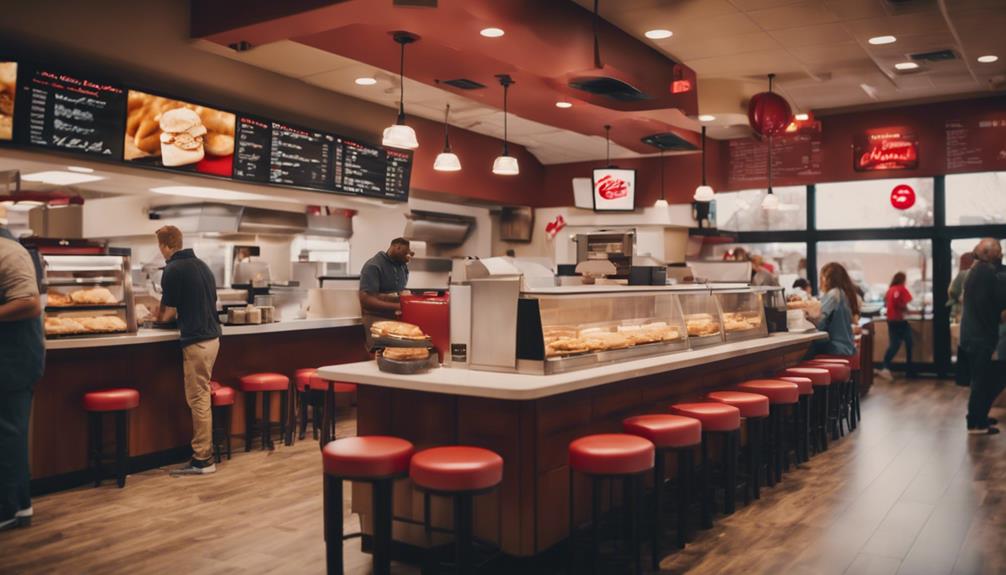Chick-fil-A franchising presents a distinctive opportunity with its unique model that combines operational efficiency and strong community ties. Operators manage restaurants without ownership, ensuring brand consistency while focusing on high customer satisfaction. The franchise boasts a low initial fee of $10,000, with additional support for startup costs, although the application process is highly selective. In addition, ongoing fees like a 5% royalty on sales maintain a robust marketing effort. This commitment to quality service and community engagement fosters strong customer loyalty, making it an appealing choice for potential franchisees. More insights await those interested in this rewarding venture.
Key Elements
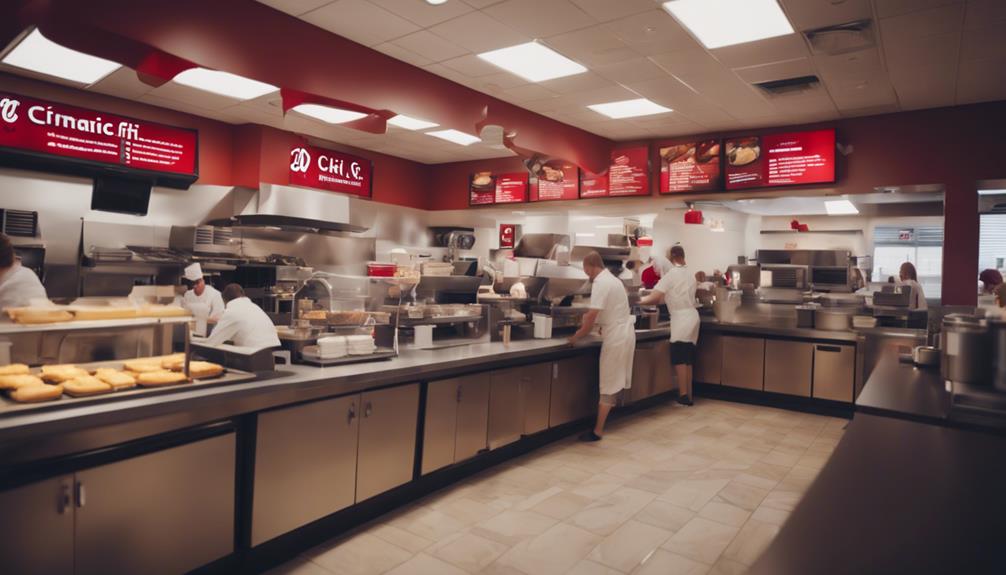
In discussing the key elements of Chick-fil-A franchising, it's crucial to understand the company's overview and its operational model.
The business landscape for franchisees reveals both opportunities and challenges that come with this unique brand.
With a focus on community engagement and customer service, prospective franchisees must align with the company's core values to succeed.
Company Overview
Chick-fil-A stands out in the fast-food industry for its commitment to quality, customer service, and community involvement, fostering strong brand loyalty among its customers.
Founded in 1946, the company has grown considerably, focusing on a limited menu that emphasizes fresh ingredients and operational efficiency.
Known for its unique ownership model, Chick-fil-A operators run the restaurants without owning them, ensuring a consistent brand experience across locations.
The company prioritizes community engagement and customer satisfaction, often ranking high in surveys.
With its expansion into key states, Chick-fil-A faces competition and operational challenges but remains dedicated to its core values, making it a distinctive player in the fast-food landscape.
Business Overview
The business model of Chick-fil-A emphasizes a unique approach to franchising, focusing on operator engagement without ownership. This fosters a consistent brand experience across all locations.
Operators run the restaurants but don't own them, creating a hands-on operational culture. Chick-fil-A selects locations and controls key aspects like menu items and pricing, ensuring uniformity and quality.
The initial franchise fee is low compared to competitors. While total investments can be substantial, the company covers many startup costs.
Operators must commit full-time, prohibiting other business ventures, which strengthens their focus on community involvement and customer service. This structure helps maintain high customer satisfaction and brand loyalty, essential for competing in the fast-food market.
Information for Franchisees
Franchisees must navigate a highly selective application process, requiring them to demonstrate strong business acumen and alignment with Chick-fil-A's core values.
This process involves three tiers, starting with a basic application and culminating in a personal interview. With around 40,000 applications submitted annually, only about 100 are chosen, reflecting an acceptance rate of approximately 0.003%.
Chick-fil-A seeks candidates with a solid background in business, preferably in the food service industry.
Operators run the restaurants but don't own them, as franchise agreements are non-transferable.
Franchisees must commit full-time, focusing exclusively on their Chick-fil-A location while adhering to strict corporate standards and community involvement, which are crucial to maintaining the brand's reputation.
Company Overview
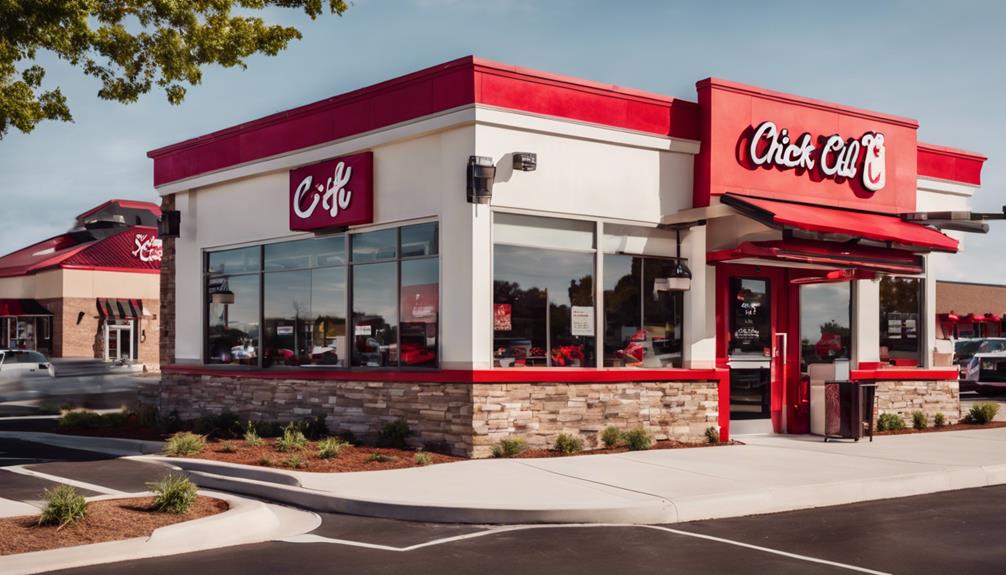
Chick-fil-A, founded in 1967, has built a strong reputation for its commitment to community impact and exceptional customer service.
The company's executive team plays an essential role in maintaining its competitive advantage in the fast-food industry.
Understanding its foundational principles and leadership can provide valuable insights for prospective franchisees.
Founding Year: 1967
Founded in 1967, this fast-food chain quickly became renowned for its commitment to quality chicken sandwiches and exceptional customer service. The founder, Truett Cathy, pioneered a unique menu centered around the original chicken sandwich, setting Chick-fil-A apart in a crowded market.
With a focus on freshness and flavor, the chain emphasized high standards in food preparation and customer interactions. Chick-fil-A's operational model, which involves selecting the best locations and maintaining strict control over brand consistency, helped it grow steadily over the decades.
Today, it stands as a prominent player in the fast-food industry, known not just for its delicious offerings but also for the loyalty it inspires among its customers.
Commitment to Community Impact
Demonstrating a steadfast commitment to community impact, the company actively engages in various initiatives that promote service, education, and support for local organizations.
Chick-fil-A regularly partners with schools, churches, and non-profits, providing resources and funding to enhance educational programs and community services.
Their charitable foundation, the Chick-fil-A Foundation, focuses on youth development through scholarships and mentorship opportunities, aiming to empower the next generation.
Additionally, the company encourages its employees to volunteer in their communities, fostering a culture of service.
Executive Team Profiles
The executive team at Chick-fil-A plays an essential role in shaping the company's vision and operational strategies, guaranteeing alignment with its core values and commitment to excellence.
Led by President and CEO Andrew Cathy, the team emphasizes innovation, customer service, and community engagement. Each member brings a wealth of experience from various industries, fostering a culture of collaboration and growth.
The leadership team prioritizes developing future leaders within the company while maintaining Chick-fil-A's unique identity. Their strategic decisions focus on sustainable growth, enhancing the customer experience, and reinforcing the company's commitment to quality.
This dedicated executive team guarantees that Chick-fil-A remains a leader in the fast-food industry while staying true to its foundational principles.
Competitive Advantage in Fast Food
Chick-fil-A consistently leverages its commitment to quality, exceptional customer service, and community engagement to maintain a competitive edge in the fast-food industry.
By emphasizing a limited menu, the company streamlines operations, ensuring freshness and efficiency. Its unique ownership model, where operators manage restaurants without equity stakes, fosters a strong focus on operational excellence and adherence to brand standards.
Chick-fil-A's rigorous selection process for operators cultivates a team aligned with its core values, enhancing customer experiences. Furthermore, the brand's impressive customer satisfaction ratings and loyalty programs contribute to its strong market presence.
As Chick-fil-A expands into new states, it faces challenges, but its operational strategies and community ties help it navigate the competitive landscape effectively.
Brand Identity

Chick-fil-A's brand identity hinges on strong customer loyalty and trust, which stems from its commitment to exceptional service.
The company's community-focused business model not only fosters a welcoming environment but also enhances its reputation among patrons.
Customer Loyalty and Trust
Exceptional customer loyalty and trust stem from a strong brand identity that emphasizes quality, service, and community engagement. Chick-fil-A cultivates these attributes through consistent messaging and actions that resonate with its audience.
Customers know they can expect fresh ingredients and friendly service every visit, building a sense of reliability. Additionally, the company's commitment to community involvement, such as local partnerships and charitable initiatives, enhances its reputation as a trustworthy brand.
This connection fosters emotional ties, encouraging repeat business. As a result, Chick-fil-A's customers often become brand advocates, sharing their positive experiences with others.
This cycle of trust and loyalty not only drives sales but also solidifies Chick-fil-A's position in the competitive fast-food market.
Commitment to Customer Service
Building on the foundation of customer loyalty, the brand's unwavering commitment to customer service plays a pivotal role in shaping its identity.
Chick-fil-A consistently exceeds customer expectations through a friendly and efficient service model. Employees are trained to prioritize guest satisfaction, ensuring every interaction reflects the brand's values.
This dedication is evident in their signature practices, like greeting customers with a warm smile and offering to carry trays. By fostering a culture of respect and care, Chick-fil-A cultivates an environment where customers feel valued.
This focus on service not only enhances the dining experience but also solidifies the brand's reputation as a leader in the fast-food industry, distinguishing it from competitors and reinforcing customer loyalty.
Community-Focused Business Model
A community-focused business model shapes Chick-fil-A's brand identity, emphasizing local engagement and relationships that foster loyalty and trust.
The company actively participates in community events, schools, and charitable organizations, demonstrating its commitment to enhancing the neighborhoods it serves. By investing in local initiatives, Chick-fil-A builds strong ties with customers, encouraging repeat business and positive word-of-mouth.
This model also aligns with its emphasis on exceptional customer service, creating a welcoming environment for families and individuals alike.
Additionally, franchise operators are encouraged to immerse themselves in their communities, ensuring that each restaurant reflects local values and preferences.
This approach not only differentiates Chick-fil-A from competitors but also cultivates a dedicated customer base that appreciates its community involvement.
Information for Franchisees
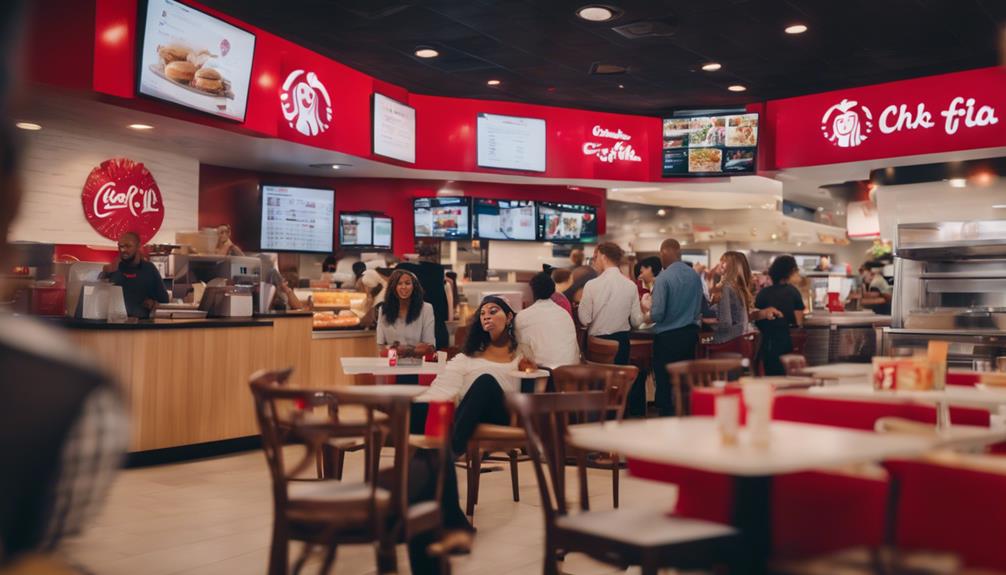
Franchisees at Chick-fil-A benefit from a supportive corporate structure that emphasizes training, community involvement, and operational efficiency.
The company provides extensive onboarding and ongoing training programs to guarantee franchisees excel in management and customer service.
Chick-fil-A encourages franchisees to engage with their local communities, fostering strong relationships that enhance brand loyalty.
Operators must commit to a hands-on approach, managing day-to-day operations while adhering to strict company standards.
Though franchisees don't have ownership or equity in their locations, they receive robust corporate support to drive their success.
The selection process is competitive, with an emphasis on aligning with Chick-fil-A's values, including a focus on quality service and community engagement, guaranteeing that each operator embodies the brand's mission.
Financial Requirements & Ongoing Fees

When considering a Chick-fil-A franchise, potential operators need to prepare for a significant financial commitment.
The initial franchise fee is just $10,000, but total startup costs can reach up to $200,000, depending on various factors.
Ongoing fees, including a 5% royalty on gross sales and contributions for marketing, are essential parts of maintaining the business.
Franchise Startup Cost: $200,000
Startup costs for opening a Chick-fil-A can range from $200,000 to $2 million, depending on various factors such as location and restaurant size.
The initial franchise fee is particularly low at just $10,000, making it attractive compared to competitors.
Chick-fil-A assists with many startup expenses, including equipment and training, which can reduce the financial burden on new operators.
However, franchisees must budget for ongoing fees, including a 15% royalty on sales, which is competitive within the industry.
This combination of a manageable initial fee and support with startup costs offers a viable entry point for those looking to join the Chick-fil-A family, despite the selective nature of the application process.
10,000 Initial Franchise Investment
Opening a Chick-fil-A requires a modest initial franchise fee of just $10,000, considerably lower than many competitors in the fast-food industry.
However, potential franchisees should prepare for a total investment ranging from $200,000 to $2 million, depending on the chosen location and restaurant size.
Chick-fil-A assists with many startup costs, providing equipment and training, which can ease the financial burden.
While the initial fee is attractive, franchisees must also be aware of ongoing fees, including a competitive 15% royalty on gross sales.
This structure guarantees that both the franchisee and the corporation share in the restaurant's success, making it essential for operators to maintain high performance and customer satisfaction.
5% of Gross Sales
Beyond the initial franchise fee, franchisees are also responsible for ongoing financial commitments, including a 15% royalty on gross sales. This plays a significant role in the overall profitability of their Chick-fil-A restaurants.
This royalty structure is competitive within the fast-food industry and reflects the brand's commitment to maintaining high standards.
Additionally, franchisees may face other costs related to operational expenses, such as staff wages, inventory, and utilities. While Chick-fil-A covers many startup costs, franchisees must remain vigilant about their ongoing financial obligations to guarantee long-term success.
Understanding these financial requirements is essential for potential franchisees as they weigh the pros and cons of entering the Chick-fil-A franchise system.
Marketing Contribution Requirements
Franchisees are also required to contribute to a marketing fund, which helps bolster the brand's visibility and promotional efforts across various regions. Typically, this contribution is 5% of gross sales, ensuring that all locations benefit from collective marketing initiatives.
This fee, alongside the ongoing royalty fee of 15% of sales, creates a total financial commitment that franchisees need to plan for. While these contributions may seem significant, they're essential for maintaining the strong brand presence Chick-fil-A enjoys.
Franchisees should view these costs as investments that help drive customer traffic and enhance brand loyalty, ultimately supporting their long-term success within the competitive fast-food landscape.
Operational Supplies and Maintenance
Operators need to budget for recurring expenses like food inventory, cleaning supplies, and equipment maintenance.
These operational supplies are essential for daily functions and can vary based on location and volume of sales.
Additionally, there's a 15% royalty fee on sales that operators must pay to Chick-fil-A, which directly impacts their overall financial planning.
Regular maintenance of kitchen equipment and restaurant facilities is also vital to verify compliance with health and safety regulations.
Financing Options

When considering a Chick-fil-A franchise, potential operators have various financing options to explore.
The company provides assistance, helping applicants understand their financial paths.
Additionally, alternative funding sources and Small Business Administration lenders can also play a vital role in securing the necessary capital.
Understanding these options is essential for anyone looking to invest in this popular brand.
Chick-Fil-A Financing Assistance Options
Chick-fil-A offers various financing assistance options to help prospective operators manage their startup costs effectively. The initial franchise fee of $10,000 is considerably lower than many competitors, enabling more candidates to enter the market.
Chick-fil-A also covers essential startup expenses, including equipment and training, which alleviates some financial burden. Additionally, operators can benefit from a competitive ongoing royalty fee of 15% of sales, maintaining affordability while allowing for profitability.
These financial structures aim to make the franchise opportunity accessible, despite its selective nature. By providing these assistance options, Chick-fil-A demonstrates its commitment to supporting its operators, ensuring they've the resources needed to succeed in a competitive industry.
Alternative Funding Sources Available
Prospective operators can explore various alternative funding sources to supplement their initial investment in a Chick-fil-A franchise.
Personal savings often serve as a primary option, allowing operators to maintain full control over their assets.
Additionally, family and friends can provide loans or gifts, easing the financial burden.
Some may consider crowdfunding platforms, where potential investors can contribute towards the franchise.
Peer-to-peer lending also offers an avenue for securing capital, connecting individuals directly with lenders.
Finally, local community development programs may provide grants or low-interest loans tailored for small businesses, enhancing access to necessary funds.
Exploring these options helps prospective operators build a solid financial foundation for their Chick-fil-A journey.
Small Business Administration Lenders
Exploring financing options through Small Business Administration (SBA) lenders can greatly enhance the financial prospects for those looking to open a Chick-fil-A franchise.
SBA loans offer favorable terms, such as lower interest rates and longer repayment periods, making them an attractive choice for prospective franchisees. These loans can cover various startup costs, including equipment and initial investments, which can range from $200,000 to $2 million.
Additionally, SBA lenders often provide guidance throughout the application process, helping applicants navigate financial assessments and documentation.
Training & Support Offered

Chick-fil-A provides extensive training and support to guarantee franchise operators succeed.
From thorough onboarding sessions to ongoing skill enhancement programs, operators receive the tools they need to thrive.
Additionally, training manuals and workshops guide them through the company's operational standards and best practices.
Comprehensive Onboarding Training Sessions
Thorough onboarding training sessions equip new operators with the essential skills and knowledge needed to uphold the brand's high standards and deliver exceptional customer service.
These sessions cover various critical areas, including operational procedures, customer engagement, and compliance with health regulations. New operators participate in hands-on training at existing restaurants, allowing them to gain practical experience alongside seasoned staff.
Additionally, they learn about Chick-fil-A's core values and community-focused approach, ensuring alignment with the brand's mission. The company emphasizes the importance of teamwork and effective communication, fostering a collaborative environment.
Continuous Skill Enhancement Programs
Operators benefit from ongoing skill enhancement programs designed to refine their management abilities and adapt to the evolving demands of the fast-food industry.
These programs focus on critical areas such as leadership, financial management, and customer service excellence. By participating in workshops and seminars, operators can stay updated on industry trends and best practices.
Chick-fil-A provides personalized coaching to help them address specific challenges they may face in their locations. This support fosters a culture of continuous improvement, ensuring operators can effectively lead their teams and enhance the customer experience.
With access to a strong network of peers and seasoned mentors, operators are empowered to drive their restaurants' success while upholding Chick-fil-A's high standards.
Training Manuals and Workshops
Thorough training manuals and workshops equip operators with the essential skills and knowledge needed to effectively manage their restaurants and deliver exceptional customer service.
Chick-fil-A provides an extensive training program, ensuring operators understand the brand's standards, operational procedures, and customer interaction techniques.
The manuals cover topics from food safety to employee management, promoting consistency across locations.
Workshops further enhance learning through hands-on experiences and real-world scenarios, allowing operators to practice and refine their skills.
Ongoing support includes access to updated resources and best practices, ensuring operators stay aligned with company values.
This robust training structure not only fosters individual growth but also contributes to the overall success of the Chick-fil-A brand in a competitive market.
LEGAL AND REGULATORY

Chick-fil-A franchisees must navigate a range of legal and regulatory requirements before opening their doors.
The company mandates transparency through legal disclosure, ensuring potential operators understand their responsibilities and obligations.
This focus on compliance helps maintain the brand's integrity and protects both the franchisee and the corporation.
Legal Disclosure Requirements
When considering a Chick-fil-A franchise, potential operators must understand the critical legal disclosure requirements involved.
These obligations include reviewing key sections of the franchise agreement, which outline the rights and responsibilities of both parties.
Clarity on these legal aspects is essential to guarantee compliance and protect their investment.
Key Sections to Review
Understanding legal disclosure requirements is essential for prospective Chick-fil-A operators, as it guarantees compliance and informs them of their rights and obligations within the franchise system.
Key sections to review include the Franchise Disclosure Document (FDD), which outlines essential financial information, fees, and obligations.
Operators should also examine any state-specific regulations that may impact their franchise operations and responsibilities.
Legal Obligations
Prospective operators must familiarize themselves with legal obligations, including the Franchise Disclosure Document (FDD), which details financial requirements and obligations within the Chick-fil-A franchise system.
This document provides essential information about fees, royalties, and operational standards.
Understanding these legal requirements helps guarantee compliance and prepares operators for the responsibilities they'll face, ultimately contributing to their success within the franchise model.
MARKET ANALYSIS
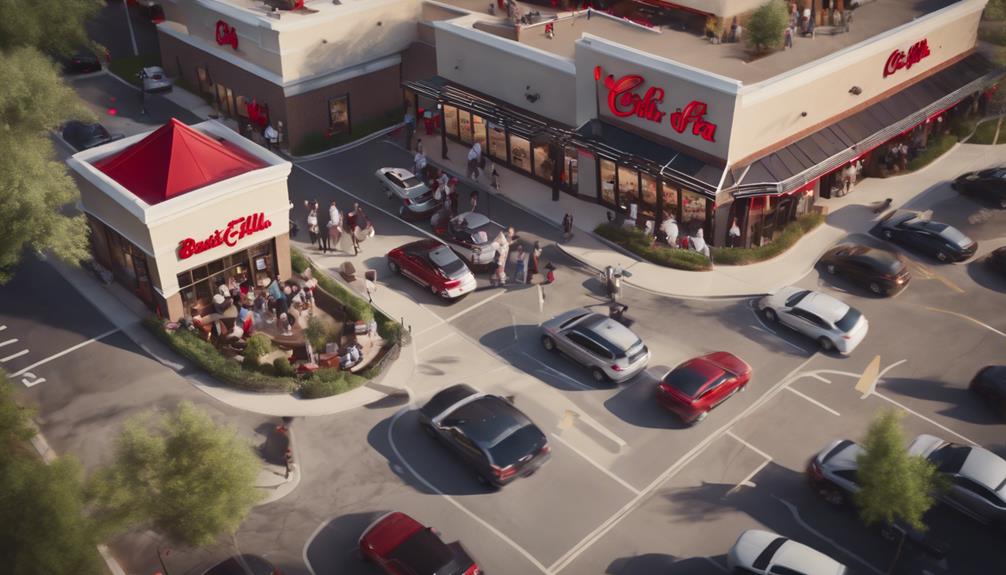
The fast food market continues to grow at a rapid pace, presenting ample opportunities for franchises like Chick-fil-A.
With Millennials and Gen Z consumers driving demand for quality and convenience, understanding their preferences is essential for success.
As these demographics increasingly seek brands that align with their values, Chick-fil-A's commitment to service and community engagement positions it well for future expansion.
Fast Food Market Growth Rate
The fast food industry is experiencing a notable shift in consumer preferences, with diners increasingly seeking healthier and more sustainable options.
This trend is shaping market dynamics, pushing brands like Chick-fil-A to adapt their menus and marketing strategies.
Understanding these market trends is essential for franchise operators aiming to thrive in a competitive landscape.
Fast Food Consumer Preferences Shift
Recent trends indicate that fast food consumer preferences are shifting towards healthier options and sustainable practices, prompting brands to adapt their menus and marketing strategies.
Consumers increasingly demand transparency regarding ingredient sourcing and nutrition.
As a result, fast food chains are introducing plant-based dishes and organic ingredients, aiming to attract health-conscious diners while maintaining the convenience and affordability that define the industry.
Fast Food Market Trends
Fast food chains are experiencing a notable growth rate, driven by changing consumer preferences and innovative menu offerings.
Healthier options and convenience remain top priorities for consumers, pushing brands to adapt quickly.
Additionally, the rise of technology, such as mobile ordering and delivery services, enhances customer engagement.
As competition intensifies, companies must stay agile to maintain market relevance and attract new customers.
Millennial and Gen Z Consumers
Millennial and Gen Z consumers are reshaping the fast-food landscape with their distinct preferences and values.
Recent consumer preference surveys indicate a strong demand for quality ingredients, sustainability, and community engagement, which align closely with Chick-fil-A's brand ethos.
Understanding these generational trends is essential for franchise operators looking to connect with this influential market segment.
Millennial and Gen Z Preferences
Chick-fil-A's appeal to younger consumers hinges on its commitment to quality, community engagement, and ethical practices that resonate with the values of Gen Z and millennials.
These generations prioritize brands that reflect their beliefs, such as sustainability and social responsibility.
Additionally, they appreciate the brand's strong customer service and involvement in local communities, making Chick-fil-A a favored choice among younger diners.
Consumer Preference Surveys
Recent consumer preference surveys reveal that younger diners prioritize quality and community involvement when choosing fast-food options.
Millennials and Gen Z consumers are increasingly drawn to brands that align with their values, emphasizing sustainability and social responsibility.
Chick-fil-A's commitment to community engagement and high-quality ingredients resonates with these demographics, making it a competitive player in the fast-food market.
Understanding these preferences is essential for franchise success.
EXIT STRATEGY

When considering an exit strategy for a Chick-fil-A franchise, it's important to understand the transfer restrictions in place.
Franchise agreements are non-transferable, meaning owners can't sell or inherit their businesses.
This limitation can greatly impact how franchisees plan for their future and exit the business.
Franchise Transfer Restrictions Apply
Franchise transfer restrictions greatly impact operators' exit strategies, as agreements are non-transferable and can't be sold or inherited.
This limitation means that if an operator wants to exit the business, they can't simply pass it on to family members or sell it to another party. Instead, they must work closely with Chick-fil-A corporate to determine the best course of action, which may include closing the location or exploring potential new operators chosen by the company.
This lack of transferability can discourage some potential franchisees, as the inability to sell or transfer ownership complicates long-term planning.
Ultimately, operators need to evaluate these restrictions seriously before committing to the franchise, as it affects their financial and personal future.
Transferability Limitations Explained
The non-transferable nature of Chick-fil-A's franchise agreements greatly limits operators' exit strategies, making it essential for them to understand these restrictions before committing to the business.
Unlike many franchises, Chick-fil-A operators can't sell or transfer their businesses, which means they've no opportunity to cash out or pass it on to heirs. This lack of transferability forces operators to evaluate their long-term commitment carefully.
If an operator decides to leave, Chick-fil-A typically reclaims the location, and the operator receives no financial gain from the sale of the franchise. Consequently, potential franchisees need to assess their willingness to invest time and effort into a business that lacks transferability options before signing agreements.
ADDITIONAL RESOURCES

When considering a Chick-fil-A franchise, it's crucial to explore the available support resources.
Franchisees benefit from a dedicated support hotline and networking opportunities that foster collaboration and knowledge sharing.
These resources can greatly enhance a franchisee's ability to navigate challenges and succeed in the competitive fast-food landscape.
Franchisee Support Resources
Chick-fil-A provides extensive support resources to help operators navigate the challenges of running a successful restaurant. New operators receive thorough training, which covers everything from restaurant management to customer service excellence. Ongoing education programs guarantee that operators stay updated on best practices and industry trends.
Additionally, Chick-fil-A offers access to a robust network of fellow operators who share insights and experiences, fostering a collaborative environment. Marketing resources, including promotional materials and digital support, help operators effectively engage with their local communities.
Moreover, Chick-fil-A's commitment to operational excellence means operators benefit from a strong supply chain and efficient systems, ultimately driving their success and enhancing customer satisfaction. Such resources empower operators to thrive within the Chick-fil-A brand framework.
Franchisee Support Hotline
Operators can access a dedicated Franchisee Support Hotline, providing immediate assistance and resources to address their operational challenges. This hotline is an essential tool for operators facing day-to-day issues, ranging from staffing concerns to equipment troubleshooting.
The support team is composed of experienced professionals who understand the unique demands of running a Chick-fil-A restaurant. By calling the hotline, operators can quickly receive guidance tailored to their specific situations, ensuring minimal disruption to their operations.
This commitment to support reflects Chick-fil-A's dedication to its operators, enabling them to maintain high standards of service and efficiency. The hotline reinforces the company's belief in fostering a collaborative environment, empowering operators to succeed in their roles within the franchise system.
Franchisee Networking Opportunities
Numerous franchisee networking opportunities exist, allowing operators to connect with peers for sharing best practices and operational insights.
Chick-fil-A encourages collaboration through regional meetings, annual conferences, and online forums. These gatherings foster a sense of community among operators, enabling them to exchange valuable experiences and strategies that enhance restaurant performance.
Additionally, franchisees can participate in specialized training sessions that focus on operational excellence and customer service. The company also promotes mentorship programs, pairing experienced operators with newcomers, ensuring guidance and support throughout the journey.
Conclusion
In summary, Chick-fil-A franchising presents a unique opportunity within the fast-food sector, combining a low entry fee with a rigorous selection process.
While aspiring franchisees don't gain ownership or equity, the brand's strong loyalty and commitment to quality make it an attractive option for dedicated operators.
Understanding the company's values and steering through the challenges involved can lead to success in this distinctive franchising model, paving the way for a rewarding career in the fast-food industry.
